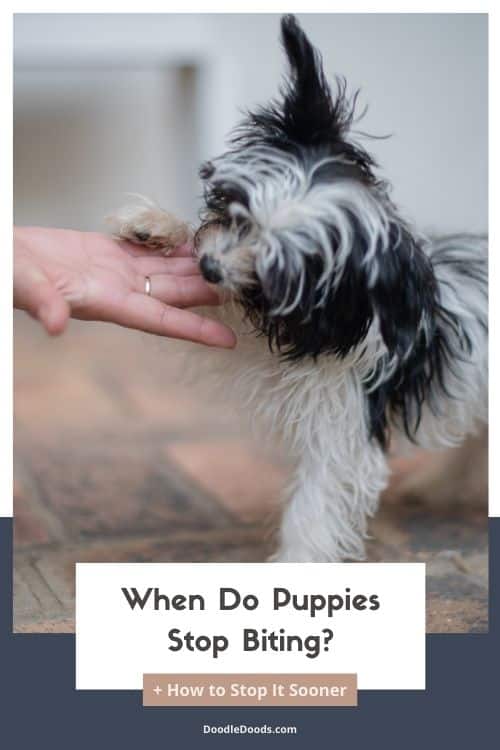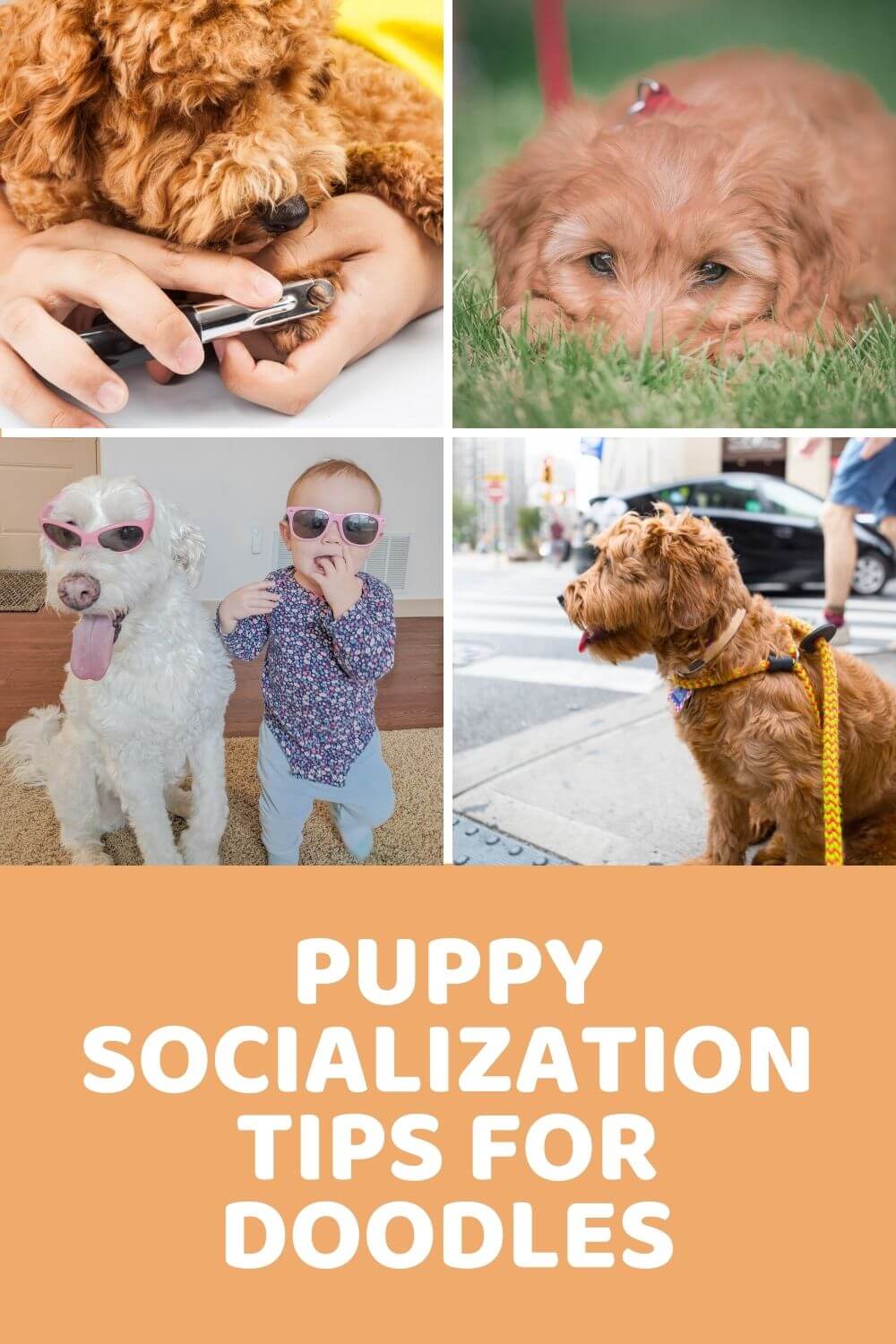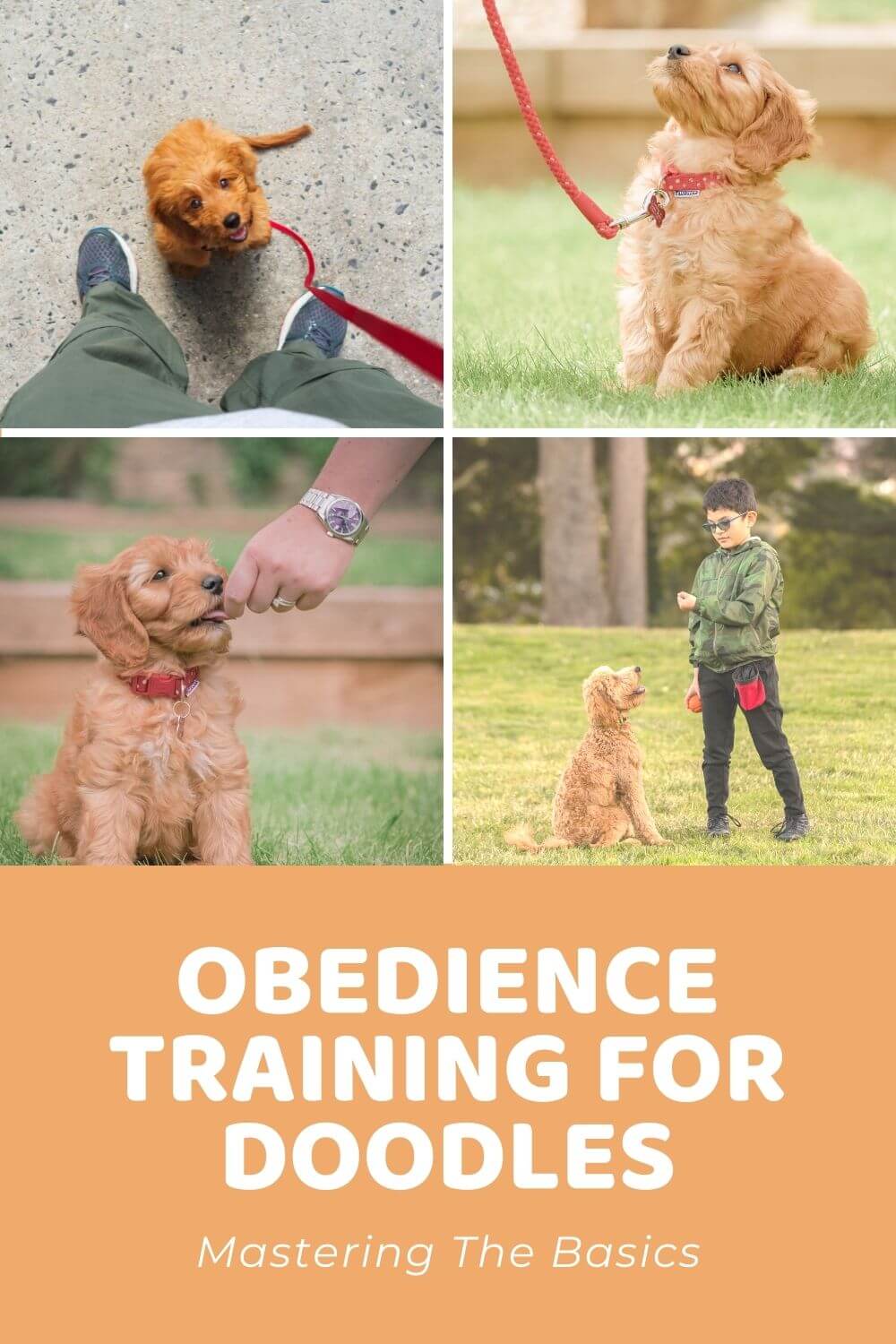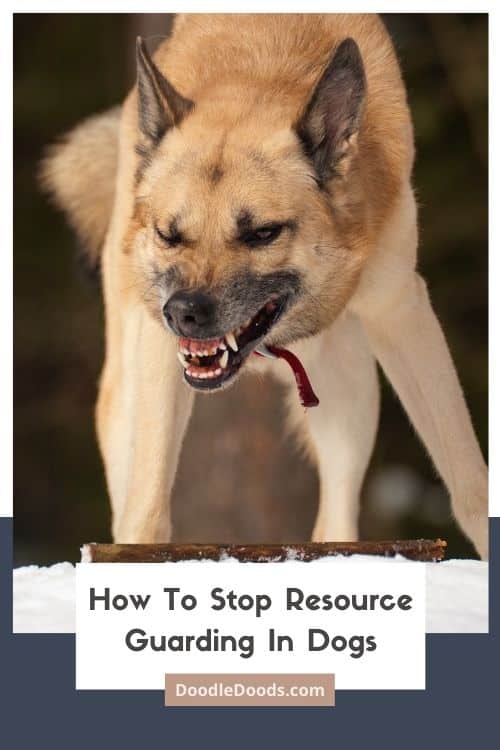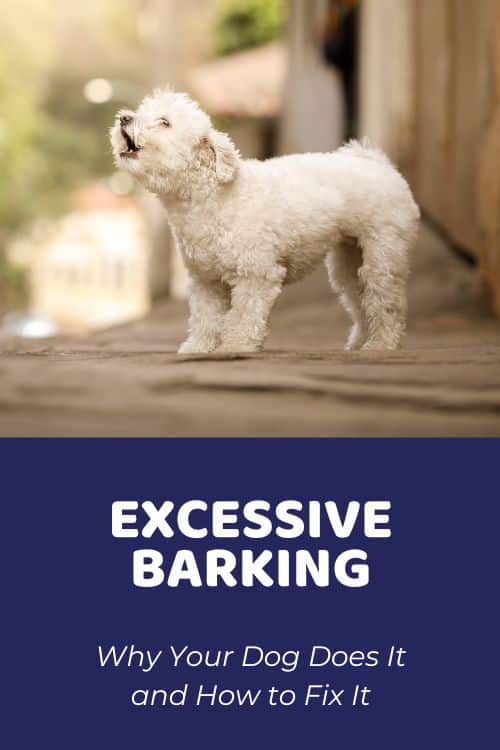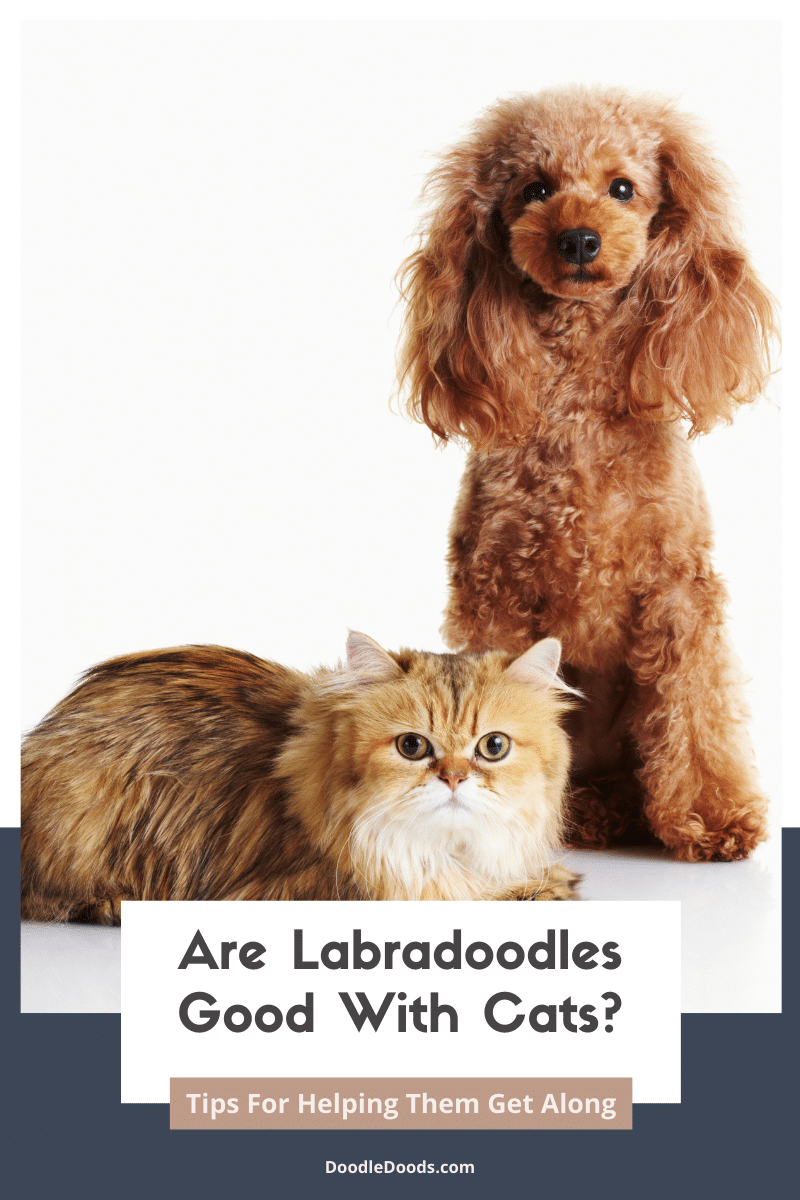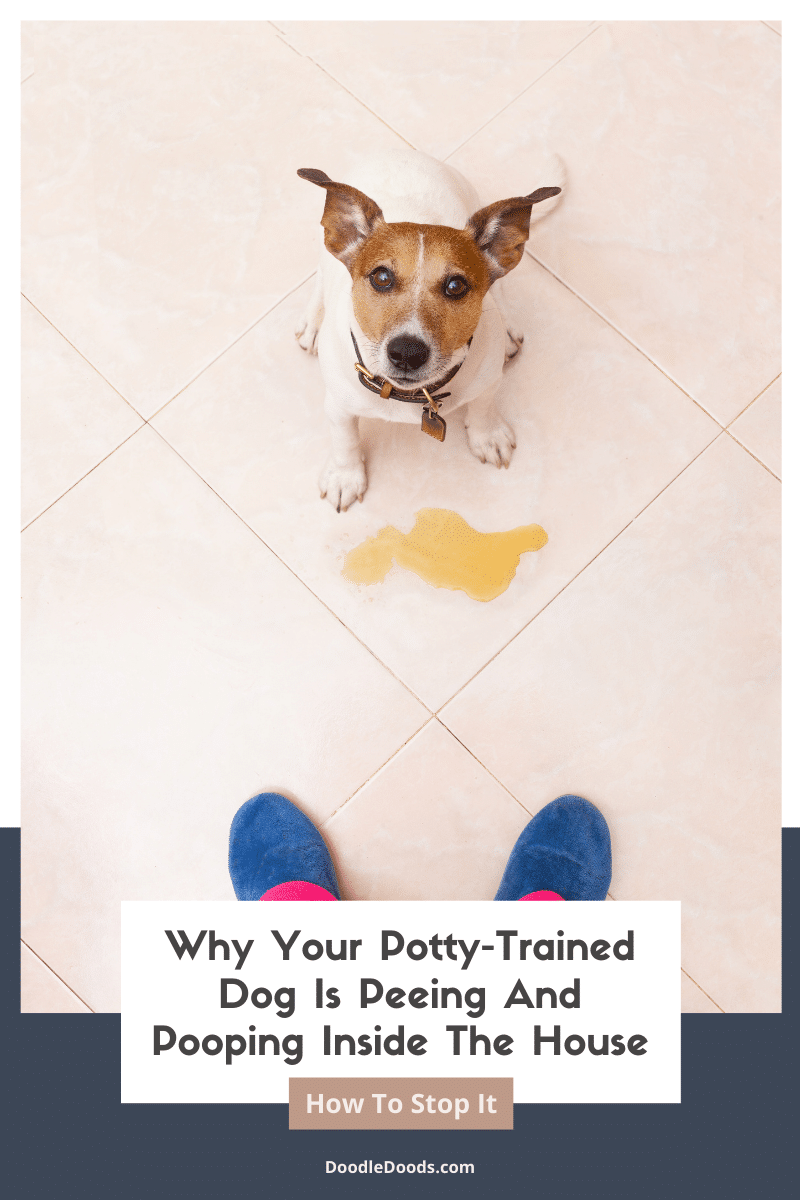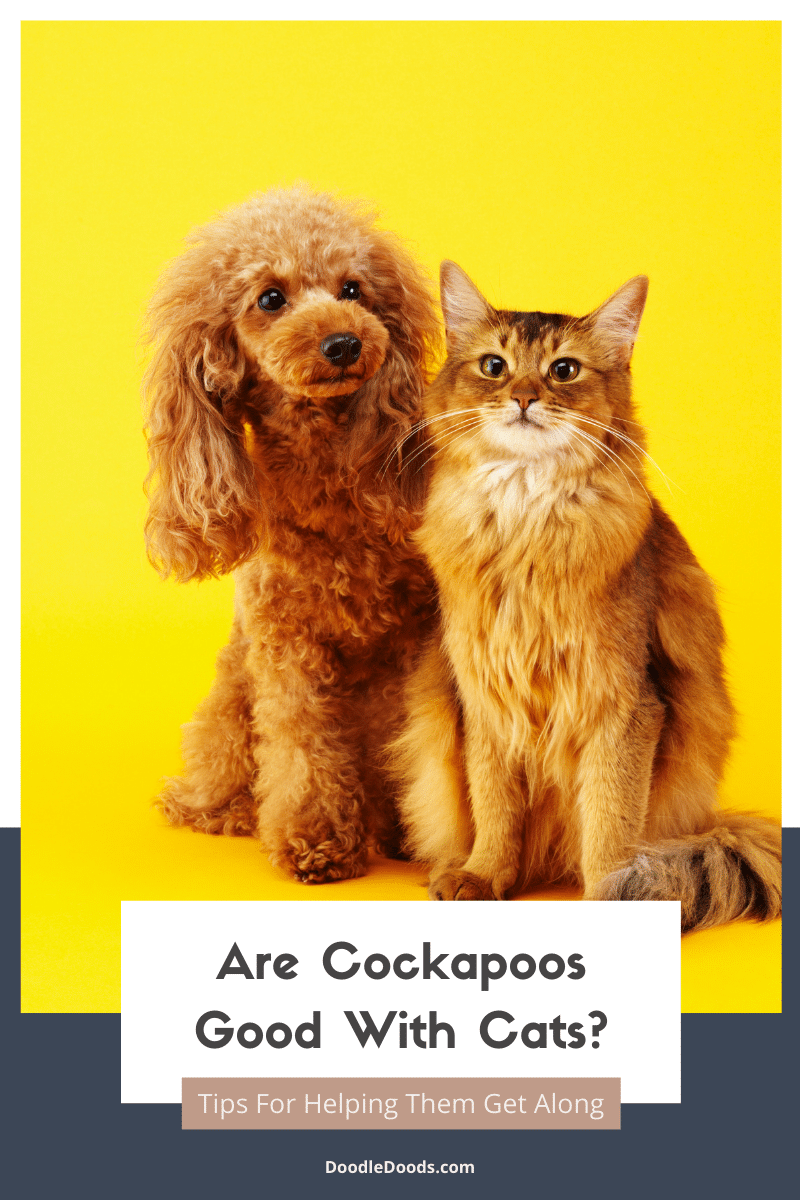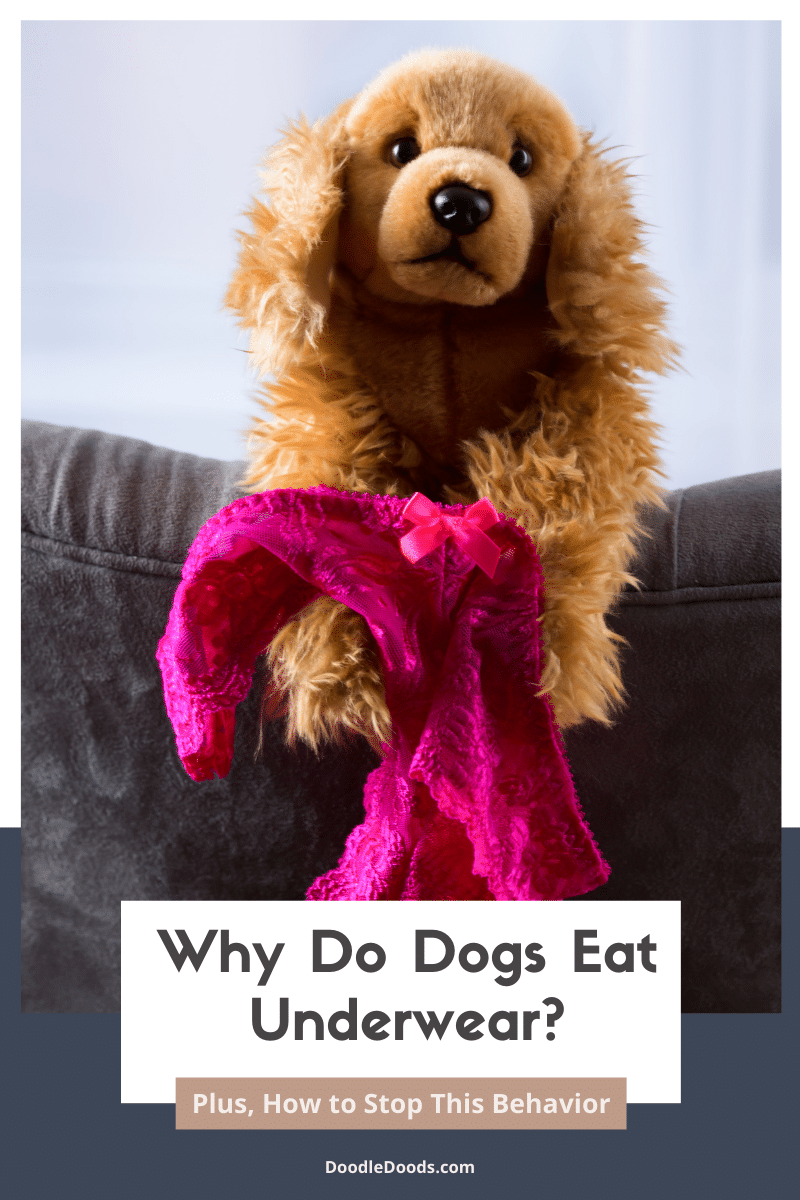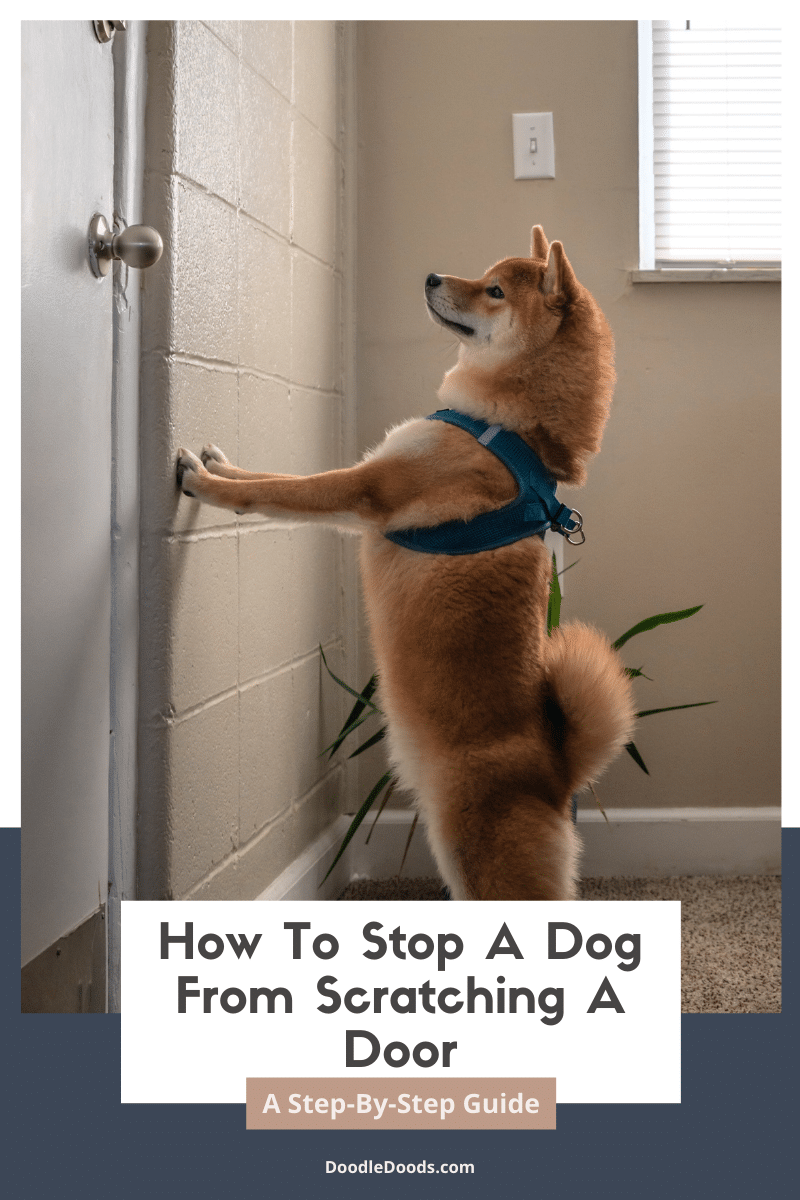Adopting a new puppy can be a happy and exciting time for all the family. In those first few delightful days, it will be tough to focus on anything besides that cute little nose, those teeny darling ears, the melting chocolate eyes, and the pin-sharp puppy teeth that ouchingly clamp down on your fingers, toes, and anywhere in between… Weren’t quite expecting that last part? Neither are many first-time dog owners! As such, you might be wondering “when will puppies stop biting?”
Experts call this “play-biting,” but it often feels far from fun. While biting behavior can initially be attributed to instinct and excitement, without too much difficulty, it can quickly become a learned response. Either way, dealing with battered and bloody body parts is no walk in the park. So, if your delightful little Dood is more feisty than you’d anticipated, here’s why and what you can do about it:
Table of Contents
- Mouthing In Puppy Development: The Various Stages
- How To Train Your Puppy Out Of Biting: 7 Proven Techniques
- Should You Be Worried About Biting Behavior?
- Things To Avoid When Training Your Puppy Not To Bite
- When Will Puppies Stop Biting: Frequently Asked Questions
Mouthing In Puppy Development: The Various Stages
Early motivations for your puppy to grip something in their mouth varies. You will, however, over the course of their development, find them doing it for each of the following:
Exploring
Much like human babies, puppies begin to make sense of the world around them with their mouths. They will bite and chew any fingers they come across in the same way they will any objects. These early bites will not seem so worrisome. They won’t hurt all that much and will mostly seem quite cute. However, don’t be fooled! In as little as a couple of weeks down the line, they will start to hurt – like a lot! So, now’s the time to start doing something about your fur baby’s biting behavior.
Teething
Generally, most puppies will start teething at around 3 to 4 months of age. At this time, they will chow down on pretty much anything they can those little canines and molars on. This kind of chewing behavior can last right up until they reach 7 months. At this age, their complete set of adult teeth will have grown in. Fortunately, there are plenty of ways you can divert teething away from your hands long before this final stage.
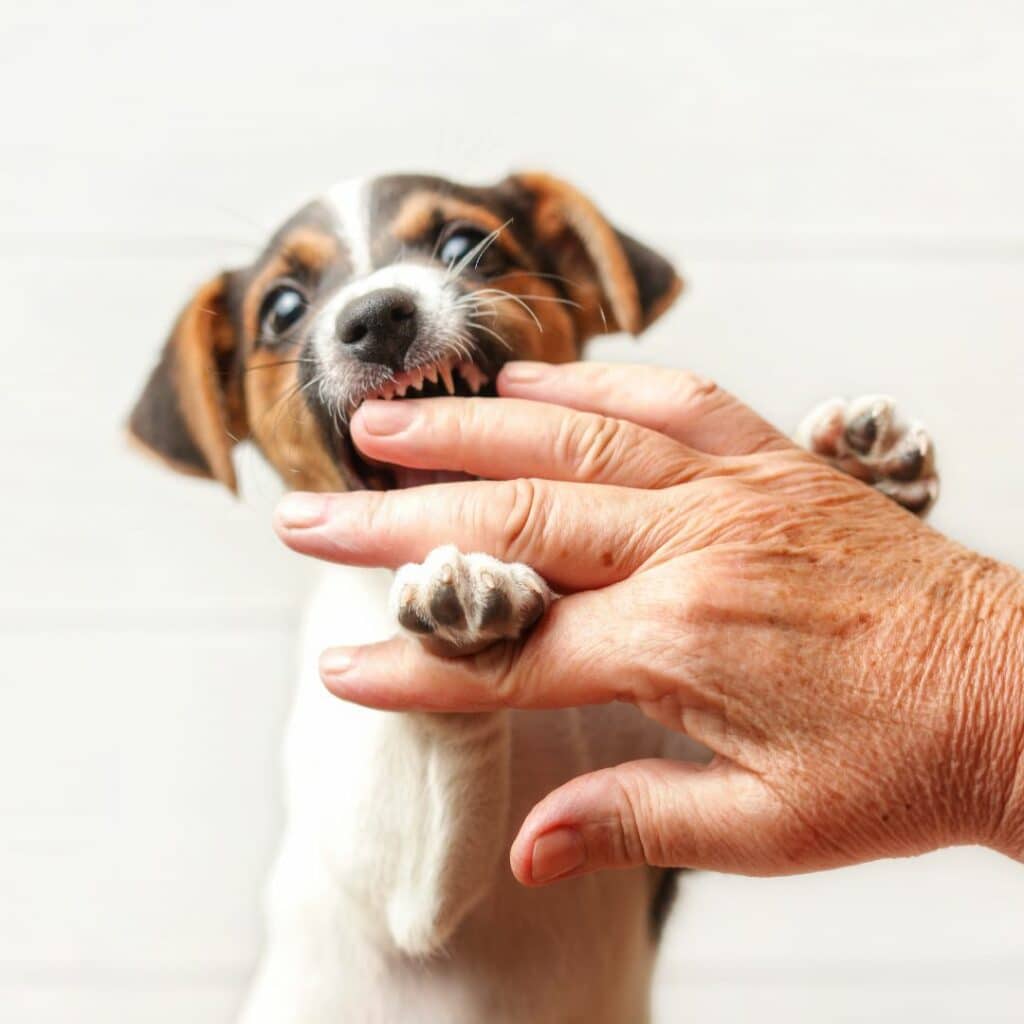
Playing
The primary reason behind much of a young puppy’s biting is play. This, after all, is how they learn to be dogs. They will use their mouths on their new owners in much the same way they do on their mom, littermates, and any other dogs they come across. Happily, this early contact will start to teach your puppy the right kind of pressure to apply to play bites vs. other types. However, this is something you will need to continue to enforce post-adoption.
Biting behavior will vary from dog to dog, but some breeds are likely to be a little biter than others. Those bred for hunting and retrieving are often more mouth-focused than their counterparts. You may think you have adopted a gentle breed and be shocked at just how much these puppies like to use their teeth. They may be little nips or seem like very real bites. However, all this can be fixed, we promise!
How To Train Your Puppy Out Of Biting: 7 Proven Techniques
Many puppies will ease out of the biting stage at the end of teething (yet still enjoy chomping away at toys and treats). However, for some, the behavior will become reinforced at this time. Less experienced owners might inadvertently prolong the biting period by encouraging rough play and giving puppies lots of attention (either positive or negative) when they do bite. This will all make it far harder to reverse.
To avoid encouraging your dog’s biting or to work against the learned behavior, we suggest doing some combination of the following:
Teach Bite Inhibition
As we touched on above, bites used in play differ greatly from the regular kind. Lessons in bite inhibition begin very early on. Learning how to moderate a bite is an essential skill for all dogs. The way this happens is that if any pup goes too over-the-top with this, the other dog will let out a high-pitched yelp to let the biter know that their bite hurt. The puppy will quickly learn to use less force in play bites.
Puppies that were separated from their mother and litter mates too early may not have learned this crucial bite inhibition. Even if they did, there’s quite a distinction between biting through fur and placing those sharp teeth directly on sensitive skin. You can send the same signal to your bab in much the same way another dog would – with a high-pitched “ow” and by moving calmly away from the game.
Socialize Your Dog Early
A great thing about dogs is that they learn better manners simply from being around other dogs. When it comes to biting in play, the other dog will let your mutt know what’s what, and this will bolster their bite inhibition. Beyond that, early socialization is also a crucial part of your Dood’s development. Like humans, canines are pack creatures and crave the company of others.
Spending plenty of time with other dogs and even other people will also help to temper your pup’s excitement of doing this. Basically, the more excited puppies tend to get, the more furiously (and harder) they will bite. Getting them adjusted to being around others from an early age will take away the novelty factor of the experience. They will have better control over all their behaviors, including biting.
Make Use of Time Out Methods
Another way to reduce the excitement factor of being around people and other pups is by using time out as a kind of negative punishment (negative in that it doesn’t involve hitting or shouting, but taking something desirable away). With this technique, the trick is to stop any play instantly the second you feel teeth on skin. Your dog won’t be getting the attention they desire and will learn another way.
Your puppy might not pick up on cues such as you turning away or even walking away. Instead, you’ll likely need to pop them in their crate. This gives them time to calm down. Overexcitement can also signal overtiredness, so they may even take this opportunity to have a little nap. You only ever want your pet crated for short periods as you don’t want them to develop negative associations with this space.
Avoid Encouraging Rough Play
The other side of this attention for better behavior coin is making sure your pup learns the right way to play. Having fun with your puppy is undoubtedly one of the better delights of dog ownership. However, roughhousing with your pet will only serve to encourage their biting, scratching, jumping up, and other undesirable behaviors. Again this will be down to too much excitement on the part of your pup.
The problem is that puppies play with enormous energy and enthusiasm. Games for them will come with a great deal of growling, snarling, jumping and, yes, biting too. They may give chase and tug on your clothes. Instead, encourage your pooch to run outdoors, fetch balls, and play tug with appropriate toys. Alternatively, if possible, you might take them down to the park to hang out with their friends.
Provide Chew Toys and Treats
As early biting is as much driven by instincts as by emotions, it can be pretty tricky to eliminate it altogether. That’s why it’s a good idea to aim to encourage your pup to direct this action towards something else. Toys and chews work perfectly for this as they will often be of far more interest to your puppy than, say, your hand. In fact, most experts recommend certain teething toys for much the same reason.
Using these kinds of distractors is also great for when your kids want to interact with the new puppy. Give your pet something to keep their teeth busy, and you can usually make as much fuss of them as you want. This can be an excellent time to teach your kids how to be around a new puppy. The importance of this cannot be stressed enough, as puppies tend to bite children and teens far more than adults.
Reward Non-Biting Behavior
The thing that’s really going to send any of these methods over the top, in terms of how quickly your puppy will pick them up, is high-value treats. Dogs tend to repeat behaviors that have a desirable outcome for them. That’s why most dog training experts recommend positive reinforcement methods above all others. However, the downside is that you can easily accidentally reinforce behaviors you don’t want.
In fact, that tends to be the case in most situations where a dog repeats an undesirable behavior. The tricky thing about pet ownership is that it’s usually the negative behaviors that owners respond to – and through this, they get further reinforced. Meanwhile, calm, quiet ones are overlooked. Avoid this by being sure to reward treats every time your puppy plays with you without using their teeth.
Training: Direct and Indirect
The most obvious way to challenge your pup’s biting is through training. Don’t worry that they may seem too young for it. In fact, the earlier you start training your pet, the better. When it comes to biting, a firm “no” command can be employed to let your hound know that what they are about to do is unacceptable. Follow this up with treats for when they obey and remove your attention if they do not.
Alongside this, teaching your puppy other commands will give them a good lesson in actions that are rewarded vs. ones that aren’t. When they master simple instructions such as “sit” and “bed,” you’ll also have another method of distraction at your disposal too. At any time in training, if your dog isn’t paying attention to you, simply turn your back on them or leave the room. This will get them back on track.
If you’re a little new to training and would like a little support with getting started, Baxter and Bella’s Online Puppy School is a great site for advice and guidance.
Enroll Your Puppy in A Class
If you’ve attempted all of the above, your pup has reached six months of age, and you are still feeling a little out of your league, in-person puppy training classes might be the right approach for you. It could be that you’re a novice pet owner and simply need a little more help, or maybe your new guy or gal is just that much more of a handful than previous dogs or from what you were expecting.
People tend to get hung up on the cute, teddy-bear appearance of Doodles and fail to see the rest. Yet these dogs can be pretty rambunctious with a ton of energy and a lot of intelligence. Without a firm and knowledgeable hand, they can often run rings around their pet parents. Dog training experts can help with this. The bonus is that puppy classes are also an excellent way to add to your pet’s socialization.
Should You Be Worried About Biting Behavior?
The kind of frenzied biting that can occur when you first bring your puppy home, and they are chasing your kids all about the house, can certainly seem worrying. And yes, if you don’t get a handle on it, it can get a little out of control. You may even start to suspect you made a mistake in bringing this furry crocodile into your home in the first place!
Fear not, though. This behavior is perfectly normal and in no way indicates that your dog is aggressive or out of control. Like other young animals (and indeed small children), you simply have to teach your new pet the right way to behave. This is something you should look to doing as soon as you can so early excitement doesn’t give way to habit. The latter is a lot harder to tackle!
Probably the biggest concern you’ll have at this time is for your children. These are often more biteable to puppies as they give a whole lot of conflicting messages. This is especially the case if they come around with a ton of energy and are running about and making lots of noise. This will hype up your pup and leave you with plenty of trouble. You need to teach kids to approach a new dog calmly.
You may also notice an uptick in your dog’s biting after commencing training. This is a process known as “extinction.” The behavior was previously reinforced, and your pal is frantically doing what they know to get the same reward as before. This can also happen in adolescence (6 months to 2 years). Dogs are very boisterous at this age. You’ll need to work hard with them using the above steps for lasting change.
Things To Avoid When Training Your Puppy Not To Bite
As with every behavior you’re looking to modify in your pet, you should never hit or otherwise punish physically punish them. This can create anxiety in your pooch and has actually been linked through research to aggression later in life. Even in mild amounts, it can all too easily damage the trustful relationship between the two of you. This is something that will take a great deal of effort for you to repair.
Yelling is counterintuitive, too. Likely puppy will see it as part of that game. Loud vocalizations of any sort tend to pitch excitement higher rather than reduce it any. That’s why any commands you administer when trying to correct behavior should be issued in a firm yet calm manner. Your pal will pay more attention to a stern and quiet voice than to a loud, seemingly out-of-control one.
When Will Puppies Stop Biting: Frequently Asked Questions
The best way to teach your puppy that you’re not overly fond of them biting at your hands and feet is to remove your attention from them. Pull your various body parts away, stand up and move away from your pup. If this doesn’t work, put them in their crate for a bit of time out. They will quickly learn that teeth bring an end to fun.
While it may seem that your puppy is acting aggressively from your perspective, it is far more likely that they are just playing. Puppies play with great gusto, doing everything they can to look fearful and menacing – puffing themselves up, snarling and growling, and even lunging. These are in no way early signs of a vicious dog.
If you do not reinforce the behavior, puppies tend to outgrow biting (hands and feet anyhow) by the end of teething. It’s usually best not to wait it out in the hopes it will disappear, however. Instead, redirect your puppy’s biting to a more suitable chew toy or tasty treat. Just make sure to get one specifically designed for dogs.
While every dog is as unique as their owners, certain breeds can tend to be a little more mouthy than others. These are often the ones that were specifically bred to do something with their mouths – hunters and retrievers. As these are typically the quintessential family pets, new owners don’t often expect to see this from them.
If your dog reaches for your hand with their teeth when you try to pet him, the issue is that he’s viewing your action as a game. When dogs play with other dogs, they use biting as a part of this. You need to teach your hound a different way to play with you, one that doesn’t involve sharp teeth on sensitive skin.
When Will Puppies Stop Biting: Conclusion
Biting is an extremely frustrating issue to deal with. Especially when you had lovely visions of cuddling your cute new family member or being able to leave them and the kids to play happily together. However, as irritating as it is, it is a perfectly normal way for puppies to behave. While many dogs grow out of this stage, it’s good to find ways to encourage this. Patience and consistency are crucial to eliminating undesirable behaviors while encouraging alternative, more desirable ones. Hopefully, the methods included in this article work for you and your Doodle.
Learn How to Care for Your Doodle Puppy!
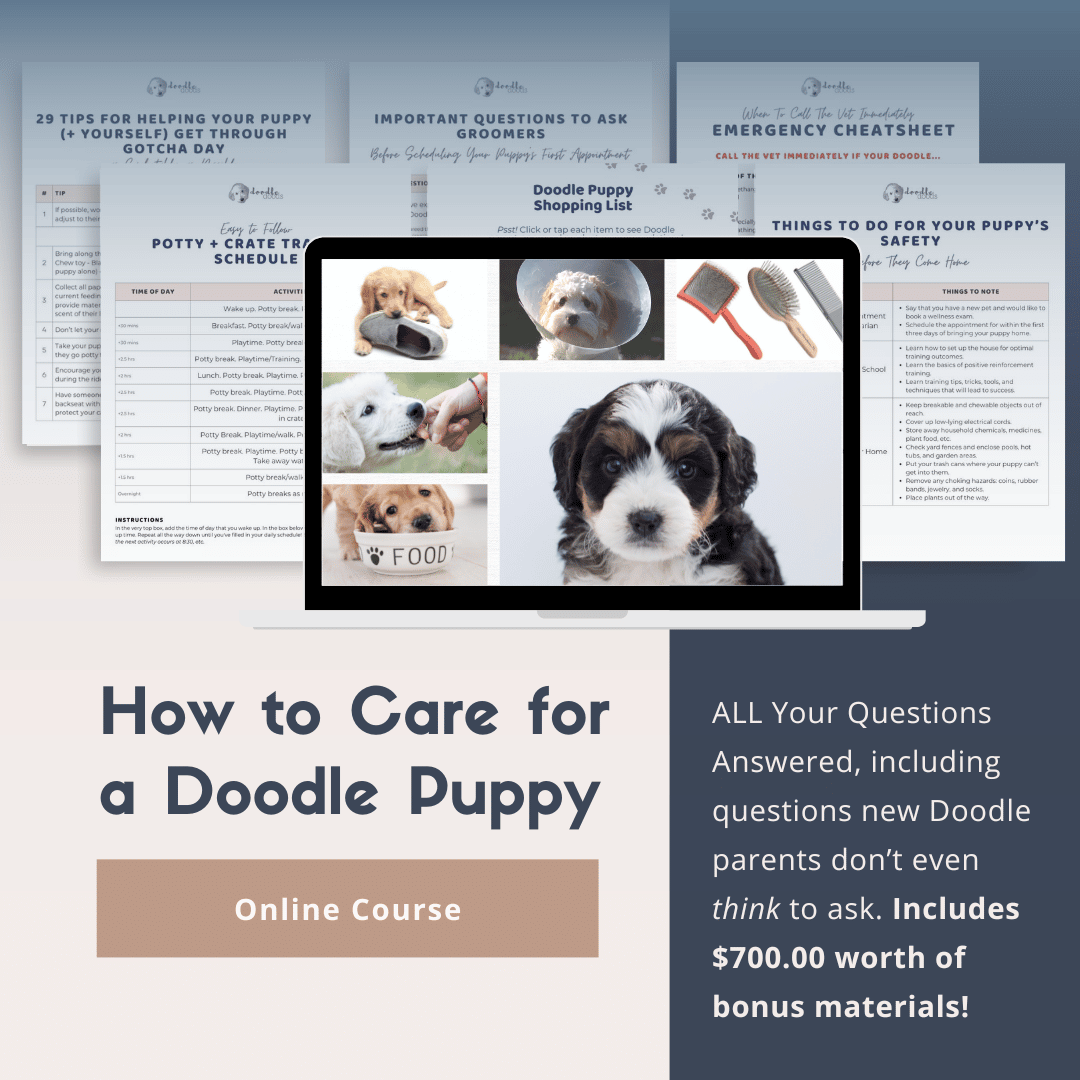
Perfect for first-time Doodle parents, get ALL your questions answered, including questions new Doodle parents don’t even think to ask.
Plus, get $700 worth of Bonus Materials for FREE, including:- Doodle Parenthood Community and Support Group ($190 value)
- Doodle Puppy Growth Tracker ($20 value)
- EMERGENCY Cheatsheet: When To Call The Vet Immediately ($50 value)
- HELP! Button ($145 value)
- And SO MUCH MORE!

